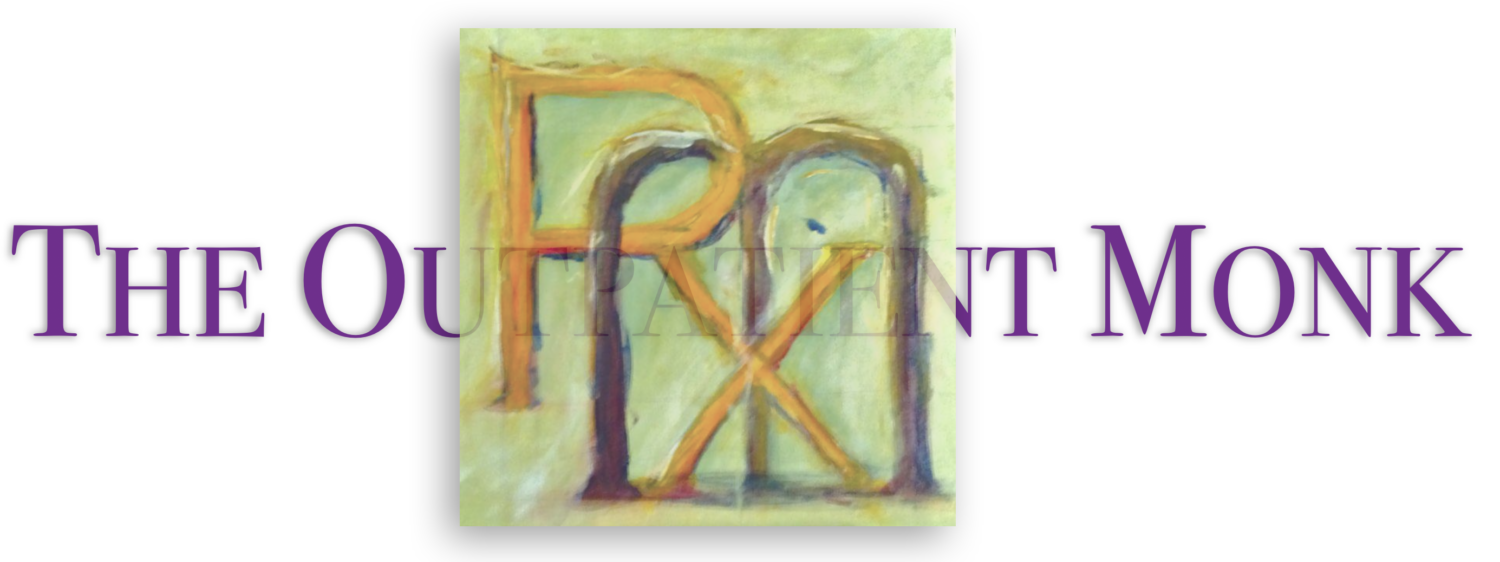Last updated on March 22, 2025
 Cynicism. In many ways it seems like the most logical, natural way to wrap up a year like 2016. There have been so many unexpected deaths: Natalie Cole, Prince, Leonard Cohen, Gwen Ifil, Florence Henderson, David Bowie, Alan Rickman, Gene Wilder. (Whew. And those are just a few.). All of these have been layered over a world hell bent on violence, and a campaign so full of insult and vitriol that even some of the campaigns’ mangers were at each other’s throats after the election. So it was a surprise, but a very small one, when many of my friends who had been supportive of the protests in the Dakotas, responded cynically to the news that the Army Corp of Engineers decided to stop the pipeline construction, at least for now. This was supposed to feel like good news. Within hours of the news going public my social media feeds were flooded with cynical claims that the announcement was a ploy just to get protestors off the land, that it wouldn’t be honored by the powers behind the pipeline, or that it was just a stalling tactic and a PR move.
Cynicism. In many ways it seems like the most logical, natural way to wrap up a year like 2016. There have been so many unexpected deaths: Natalie Cole, Prince, Leonard Cohen, Gwen Ifil, Florence Henderson, David Bowie, Alan Rickman, Gene Wilder. (Whew. And those are just a few.). All of these have been layered over a world hell bent on violence, and a campaign so full of insult and vitriol that even some of the campaigns’ mangers were at each other’s throats after the election. So it was a surprise, but a very small one, when many of my friends who had been supportive of the protests in the Dakotas, responded cynically to the news that the Army Corp of Engineers decided to stop the pipeline construction, at least for now. This was supposed to feel like good news. Within hours of the news going public my social media feeds were flooded with cynical claims that the announcement was a ploy just to get protestors off the land, that it wouldn’t be honored by the powers behind the pipeline, or that it was just a stalling tactic and a PR move.
This cynical turn would be negligible had it not been such a sudden, broadly expressed, and widely accepted sentiment. Even if these fears prove to be true, the speed that they were communicated and embraced said more about the habits of our hearts than our insight into the world. We have been steeping in a rhetoric of deep conflict and distrust for months and years on end. We have become so accustomed to enmity that assuming the worst no longer feels like pessimism, it feels like a practical defense mechanism, a way of tempering or restraining our hopes. It seems as if lowering our expectations actually seems like a useful, if not necessary practice to prepare us for when the other shoe inevitably falls.
I understand its appeal. Presuming the darkness is an endeavor that is rarely disappointed. But I am a Christian, and this is Advent, and it strikes me that cynicism, in its many forms, runs cross grain to the hope I am to be cultivating, especially during this time. Therefore it has no place in my life. So, Now what? What do we do when the most logical, natural conclusion, is incompatible with Christian practice and convictions? What do we do when it runs cross grain to our faith?
I am increasingly convinced that when we speak of hope in contemporary 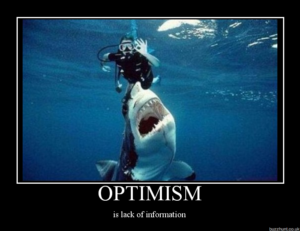 idioms, what we really mean is still cynicism. We say, ‘I sure hope its not cancer,” “Well, let’s just hope he/she doesn’t get elected.” We say such things tainted with the faint conviction that what we say we are hoping for is actually probably unlikely. “I sure hope it is not cancer (it probably is, get ready for it)” “Well, let’s just hope he/she doesn’t get elected (They might, they probably will, and then what will we do?)” Cynicism: preparing for the worst so it doesn’t hurt like it could have if we had longed for something better.
idioms, what we really mean is still cynicism. We say, ‘I sure hope its not cancer,” “Well, let’s just hope he/she doesn’t get elected.” We say such things tainted with the faint conviction that what we say we are hoping for is actually probably unlikely. “I sure hope it is not cancer (it probably is, get ready for it)” “Well, let’s just hope he/she doesn’t get elected (They might, they probably will, and then what will we do?)” Cynicism: preparing for the worst so it doesn’t hurt like it could have if we had longed for something better.
Aha. So longing leads us to disappointment? There is the rub. There is where the safe-zone of cynicism has to give way for me and the Advent disciplines and practices of hope.
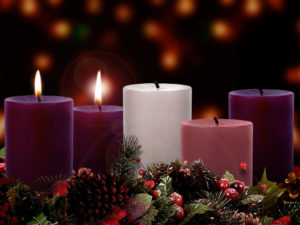 Advent captures this best in that it is a season of longing. It is the time we set aside to realign ourselves with the Gospel. It is a time to openly ache for Christ’s redemption of all creation We long for Christmas- for the incarnation, we long for his return, we long for justice to be done and the world to be made right.
Advent captures this best in that it is a season of longing. It is the time we set aside to realign ourselves with the Gospel. It is a time to openly ache for Christ’s redemption of all creation We long for Christmas- for the incarnation, we long for his return, we long for justice to be done and the world to be made right.
It is this practice, this discipline of longing that makes hope so wildly different than cynicism, but also different from cavalier optimism that assumes, “Everything happens for a reason, “ or that, “everything is going to be alright.”
The safety of both cynicism and crass optimism is that it draws conclusions (and that it usually does so fast) Practicing hope, far from being a conclusion, is a  prying open of the rib cage and exposing of one’s heart to the elements that proclaim, “I don’t know exactly how this will turn out but I trust that doing the right thing,… is the right thing.” Hope impales us on the infinite number of possible turns that history can take, but believes that God has not abandoned us in any one of them. …In which case, even a failure, is not a conclusion.
prying open of the rib cage and exposing of one’s heart to the elements that proclaim, “I don’t know exactly how this will turn out but I trust that doing the right thing,… is the right thing.” Hope impales us on the infinite number of possible turns that history can take, but believes that God has not abandoned us in any one of them. …In which case, even a failure, is not a conclusion.
So while cynicism may be the natural conclusion of this year, Advent points elsehwere. Cynicism may be natural, but hope is still…helpful, brighter, open…and perhaps supernatural. Hope welcomes surprises and is often glad to be proved wrong if it means there are new possibilities opening up (and there usually are, especially if we work to open them).
Cynicism says, “Don’t get your hopes up, someone else has already written the script and we are not the winners.” Optimism says, “Everything will be OK. It all happens for a reason. Someone else has written the script and it will all make sense, even if we don’t like the ending” Hope says, “Stand firm, we are doing the right thing, and the story never ends with us. We move toward God, and God is moving toward us, and will keep moving even after we are gone.”
So cynicism and optimism remain a kind of habit that expects to resolve our experience of ambiguous social relations to predictable, or at least probable 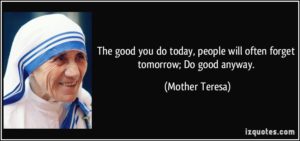 outcomes. Hope is a discipline. It is something we have to practice and something to which we have to return again and again. We do so by putting our faith in something greater than ourselves, by letting go of the immediate outcomes of our practices, and by being willing to imagine good things… beyond what we can imagine.
outcomes. Hope is a discipline. It is something we have to practice and something to which we have to return again and again. We do so by putting our faith in something greater than ourselves, by letting go of the immediate outcomes of our practices, and by being willing to imagine good things… beyond what we can imagine.
Hope is in the words of Mother Teresa admonishing us to live …anyway:
People are often unreasonable, irrational, and self-centered. Forgive them anyway.
If you are kind, people may accuse you of selfish, ulterior motives. Be kind anyway.
If you are successful, you will win some unfaithful friends and some genuine enemies. Succeed anyway.
If you are honest and sincere people may deceive you. Be honest and sincere anyway.
What you spend years creating, others could destroy overnight. Create anyway.
If you find serenity and happiness, some may be jealous. Be happy anyway.
The good you do today, will often be forgotten. Do good anyway.
Give the best you have, and it will never be enough. Give your best anyway.
In the final analysis, it is between you and God. It was never only between you and them anyway.
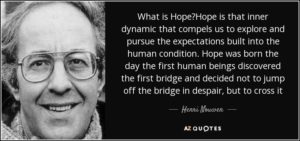 Cynicism is a habit, and while it seems appropriate for this particular mudslung and noisesome year, it is still a bad habit. Gross optimism is no better. What is needed, what is possible, what we are called to, is to be a people of hope: the kind of hope that wrecks us on the wheels of life, the kind of hope that puts love in irrational places (which is sometimes known as grace), the kind of hope that banks on the Story being about so much more than what I need, can accomplish or even see. Hope flings itself at love, and trusts the landing.
Cynicism is a habit, and while it seems appropriate for this particular mudslung and noisesome year, it is still a bad habit. Gross optimism is no better. What is needed, what is possible, what we are called to, is to be a people of hope: the kind of hope that wrecks us on the wheels of life, the kind of hope that puts love in irrational places (which is sometimes known as grace), the kind of hope that banks on the Story being about so much more than what I need, can accomplish or even see. Hope flings itself at love, and trusts the landing.
And hope is not everything…. It is certainly up there with Faith and Love… but in the end only love remains. And somehow, that gives me hope, at least for today.

